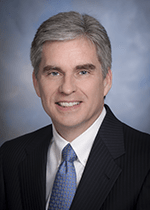
At nearly 73 million strong, millennials (those born between 1981 and 1996) are about to pass baby boomers as the nation’s largest generation. Within the next two years, they will account for 50% of the American workforce. We feel their impact in every industry. They are our current and future leaders.
Arkansas Blue Cross and Blue Shield has invested in learning about this distinctive generation. We partnered with the national Blue Cross Blue Shield Association on several studies seeking to understand millennials and reveal the root causes of their health challenges.
We’ve made some startling discoveries. One is that a third of millennials have health conditions that reduce their quality of life and their life expectancy. Ironically, though this generation has witnessed many historic breakthroughs in both technology and medicine, their health is worse than prior generations. Mental health issues are much more pronounced, making up six of the 10 top health issues affecting millennials. Clearly, behavioral health services, including treatment/prevention of substance use disorders, will be a bigger issue going forward. And a jump in the prevalence of type 2 diabetes is something that warrants addressing.
As a health plan leader and parent of a member of the generation following the millennials, this report was a chilling eye-opener. And if that were all we had learned about millennials, I might be discouraged. But that’s not all we learned.
We also learned about millennials’ perspectives, practices and preferences regarding healthcare. Through surveys and face-to-face listening sessions, we learned that millennials:
- Embrace technology and value responsiveness and convenience. This signals to me that we are heading in the right direction by pursuing initiatives like telemedicine and remaining highly focused on providing excellent and personalized customer service.
- Want a personal connection with a healthcare provider and value “whole person” care. This is music to my ears because it fits perfectly with integrated, coordinated care and preventive services. Primary care will play a key role in addressing millennials’ health issues.
- Are more likely to forego care due to cost. Nearly half of millennials said they do this – more than triple the rate among baby boomers. This finding validates our work on payment models that reward clinical effectiveness. Likewise, it validates our investment in technology to streamline processes and lower administrative costs.
When I look at the results of these studies, one thing is clear. We’re going to have to do things differently. This is a clear call to action for all of us working in healthcare. Now that we are aware of the challenges and opportunities, it is incumbent on us to create better products, services and systems to meet the needs of millennials where they want to be met. No doubt, this will involve pairing personalized attention with easy-to-use digital services in new and different ways. And we must work with healthcare providers to ensure a person’s physical and mental health needs are being met. At Arkansas Blue Cross, we’ve already started down this path, but there is much more work to be done and we must move faster. We know that this generation – and those who follow – are counting on us.

